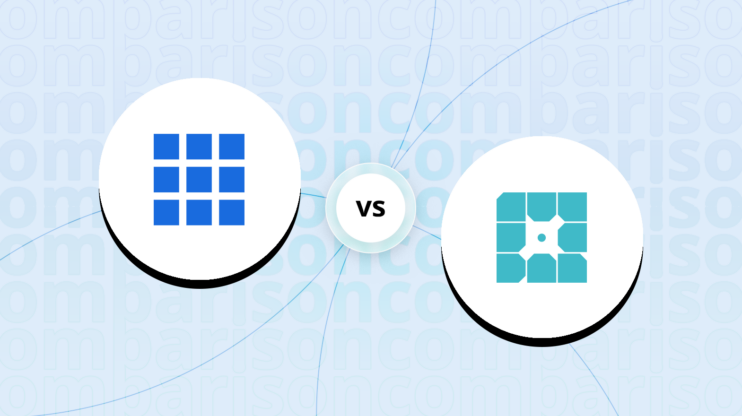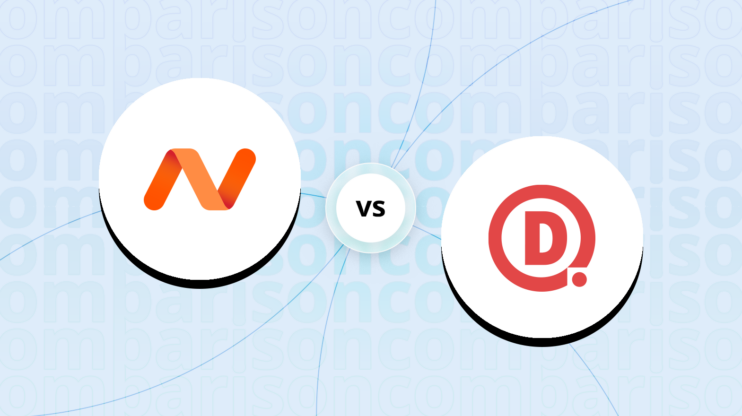Pagely vs Rocket.net: Final verdict
Looking over Pagely vs. Rocket.net, both offer exceptional hosting services, but they cater to different user needs.
-
Rocket.net (Overall grade: 8.3)
shines with its well-rounded, speedy, and customer-oriented service. Its globally distributed network and advanced speed technologies, including an enterprise-level CDN and WAF, ensure top-tier performance and fast load times. Rocket.net’s strength lies in its user-friendly setup, real-time protection, and additional perks like free migrations and strong WooCommerce support, making it a great choice for businesses seeking cost-effective and comprehensive WordPress hosting. -
Pagely (Overall grade: 8.1)
stands out for its high availability and robust security features, made possible by leveraging AWS infrastructure. It guarantees 99.99% uptime with advanced redundancy and failover systems. The customizable and highly scalable plans make Pagely ideal for enterprises needing bespoke solutions with a focus on performance and security. However, Pagely’s higher pricing may be a consideration for smaller businesses or those with budget constraints. Despite this, its advanced features and managed WordPress upgrades position it as a powerful option for high-traffic and media-heavy websites.
 Overall grade:8.1 |
 Overall grade:8.3 |
|
|---|---|---|
| Uptime and Availability | 9.5 | 8.6 |
| Hosting Performance | 8.8 | 9.1 |
| Hosting Security | 9.2 | 9.1 |
| Price | 7.4 | 8.3 |
| Hosting Features | 4.6 | 4.6 |
| Ease Of Setup | 8.2 | 9.1 |
| User Management | 8.4 | 8.5 |
| Customer Support | 8.9 | 9.2 |
| User feedback | 4.9/5 | 5/5 |
Hosting types offered
Both platforms provide a variety of hosting types, each designed to meet the different needs of users.
 |
 |
|
|---|---|---|
| Shared hosting | ||
| Cloud hosting | ||
| WordPress hosting | ||
| Ecommerce hosting | ||
| VPS hosting | ||
| Dedicated hosting |
Although both offer a variety of hosting plans tailored to different needs, in
certain cases, one platform may prove to be more suitable.
features, making it a better choice for businesses prioritizing long-term growth and stability in their ecommerce endeavors.
Detailed comparison
Uptime and availability
Evaluates the average uptime statistics, uptime guarantee and overall availability of the hosting
provider
Score Components:
- Uptime percentage (30%): evaluates the uptime statistics in given period of time
- Uptime guarantee (20%): Assesses if the platform offers an uptime guarantee and
whether the actual uptime matches the promised guarantee. - General performance (25%): Evaluates how fast is the average response time and overall
it’s stability. - Responsiveness (10%): Adaptability to different devices and screen sizes.
- Availability (25%): Reflects the total downtime and number of outages.
 9.5
9.5
 8.6
8.6
Winner Pagely: A powerhouse in uptime and availability, ensuring unparalleled performance and reliability.

Pagely excels with a guaranteed 99.99% uptime, fortified by a high availability architecture across 14 global data centers. This ensures maximum uptime, thanks to features like multi-region redundancy, automatic load balancing, and emergency fallback solutions. The robust 24/7 uptime monitoring system delivers an impressive 211ms average response time and handles 1,965 requests per second efficiently, making it an excellent choice for high-demand environments.

Rocket.net offers a solid 99% uptime and noteworthy performance metrics, including a 73ms response time and a 99% performance rating. With 275+ global edge locations and comprehensive support available around the clock, Rocket.net ensures reliable service. Features like Enterprise CDN, WAF, and free migrations further enhance its appeal, making it a strong contender for WordPress hosting, despite a slightly lower uptime guarantee compared to Pagely.
Which one has better hosting performance?
Score Components:
- Hosting speed (30%): This includes SSD quality, Load times, PageSpeed score ranges,
additional information on website speed, built-in plugins for performance enhancement, available caching
methods, and CPU/RAM options - CDN (20%): Considers whether CDN is available or not, whether it’s free or paid, and
the quality of the CDN service - Available data centers (30%): Evaluates the number of data centers and their locations
globally. - Scalibility (20%): Looks at whether elastic scaling is available, the process required
to scale (manual upgrade vs. automatic scaling), the presence of dedicated servers, and the costs
associated with scaling.
 8.8
8.8
 9.1
9.1
🏆 Winner: Rocket.net: Streamlined and exceptionally fast hosting service.
When it comes to general performance, Rocket.net excels with its globally distributed network of 275+ edge locations and cutting-edge speed technology. Utilizing enterprise CDN and WAF at no extra cost, Rocket.net ensures faster website load times compared to its competitors. Pagely also offers a high level of performance through its customizable plans, advanced security features, and Amazon AWS-powered infrastructure, but it is generally pricier and more suited for large-scale applications. Both hostings offer managed WordPress upgrades and flexible configurations, but Rocket.net provides superior speed out of the box.
Website speed
Rocket.net takes the lead in terms of website speed, with an average Time to First Byte (TTFB) of around 83ms, significantly faster than its competitors like Flywheel, Kinsta, and WPEngine. Rocket.net’s pre-configured settings for maximum speed, combined with Enterprise NVMe servers and optimized PHP, contribute to its faster load times. Pagely, while also offering no cap on PHP workers and SSD storage, doesn’t match the out-of-the-box speed optimization found in Rocket.net.
Scalability
Rocket.net doesn’t provide specific details about scaling, leaving some uncertainty about its elasticity and dedicated server offerings. Pagely, on the other hand, offers customizable and highly scalable plans. Pagely’s top-tier “Scale” plan allows you to configure vCPU, RAM, and SSD storage according to your needs and provides dedicated database resources, but it comes at a steep price starting from $2500/month. For businesses requiring multi-region redundancy and bespoke deployments, Pagely offers solutions starting from $2,500/mo.
Which one has better security features?
and regulatory requirements
Score Components:
- Technical security measures (40%): This includes encryption, firewalls, DDoS
protection, secure configurations, server monitoring, access control and availability of security addons
(e.g Sitelock security). - Operational security measures (30%): Encompasses data privacy, backups and data
redundancy. - Compliance and certifications (20%): Adherence to legal and regulatory requirements
(e.g., GDPR, HIPAA) and possession of certifications (e.g., ISO 27001, SOC 2). - Business and reliability (10%): Factors in the provider’s reputation, uptime
guarantees, and customer support.
 9.2
9.2
 9.1
9.1
🏆 Winner Pagely: Pagely offers a robust suite of security features and compliance certifications that ensure WordPress environments are well-protected and adhere to regulatory standards.
Technical security measures:
Both Pagely and Rocket.net provide strong technical security measures. Pagely utilizes AWS Shield Standard for DDoS protection and has a proprietary web application firewall to protect servers from malware and emerging threats. Rocket.net employs an enterprise-level website application firewall (WAF) and real-time malware protection powered by Imunify360, ensuring both known and unknown malicious codes are intercepted. Pagely offers long-term support for PHP versions 7.4 or newer, whereas Rocket.net supports a wider range of PHP versions, including 5.6, 7.4, 8.0, 8.1, 8.2, and 8.3.
Operational security measures:
Pagely provides a customizable two-factor authentication (2FA), advanced brute force protection protocols, and continuous resource isolation for all clients. They also offer daily malware scans and 24/7 uptime monitoring. Rocket.net, on the other hand, focuses on proactive protection with always-on security measures, automated updates for WordPress core, plugins, and themes, and efficient brute force protection. Both hosts ensure strong anti-spam measures and regular vulnerability patching to guard against threats.
Compliance and certifications:
Pagely has obtained SOC 2 Type I and Type II certifications, ensuring their systems meet strict trust service criteria. They are also fully compliant with PCI-DSS and GDPR regulations. Rocket.net checks all boxes for PCI compliance and ensures GDPR compliance through proper handling and use of personal data. Neither host provides specific details about HIPAA compliance.
 |
 |
|
|---|---|---|
SSL certificate |
Let’s Encrypt and Custom SSL Certificates |
Unlimited Free SSL Certificates |
Additional security features |
DDoS protection, WAF, 2FA, Anti-Spam Filtering |
Malware Protection, Always-on Protection, Bot Protection |
PHP versions |
Long-term support for PHP 7.4 or newer |
5.6 to 8.3 |
GDPR compliance |
Yes |
Yes |
HIPAA compliance |
Not specified |
Not specified |
PCI compliance |
Yes |
Yes |
Hosting features
Score Components:
- Domains (20%): Assesses the availability of a free domain, domain purchase options, and
pricing - Email (15%): Considers if the provider offers full email hosting, or is reselling
third-party service, and if the email is only transactional or not - Website builder (15%): Checks if website builder is available, and it’s user
friendliness and overall the level of customization allowed. - Staging environment (20%): Determines if a staging environment is available, allowing
for testing changes before going live. - FTP & SFTP accounts (10%): Evaluates if and how easily users can access FTP and
SFTP accounts - Git and SSH access (20%): Assess whether Git is integrated into the hosting service and
if SSH access is provided
 4.6
4.6
 4.6
4.6
🏆 Winner: Pagely: Offering robust performance with advanced security features and flexible configurations.
Pagely’s emphasis on high availability and security stands out. Leveraging AWS Cloud, it ensures 99.99% uptime and offers resilient features like advanced network security, automated backups, and disaster recovery. This makes Pagely a superior choice for businesses needing reliability and data protection. Its customizable configurations and managed WordPress upgrades cater to developers and enterprises requiring tailored solutions. On the other hand, Rocket.net excels in user-friendly features and customer convenience. With a secure file manager, one-click staging environments, and simplified database management, Rocket.net appeals to users looking for ease of use and quick deployment. Furthermore, Rocket.net’s free test migrations and enterprise edge CDN are practical additions for those aiming to optimize site performance and minimize downtime.
 |
 |
|
|---|---|---|
Free domain |
No |
No |
Free SSL |
Yes |
Yes |
Email hosting |
No |
No |
Website builder |
No |
No |
Staging environment |
Yes |
Yes |
FTP & SFTP accounts |
Yes |
Yes |
Git and SSH access |
Yes |
Yes |
Free backup |
Yes, daily |
Yes |
Money back guarantee |
No |
No |
As a result in rare cases the features mentioned here can differ from the ones you see on their websites.
Both providers support a range of users from beginners to experts with user-friendly website builders and WordPress staging areas. However, in terms of developer tools, both Pagely and Rocket.net offer robust options including SSH access, support for multiple programming languages, and Git for version control, thus appealing to developers looking for advanced capabilities.
Email services:
Neither Pagely nor Rocket.net offers dedicated email hosting services. For transactional emails, Pagely focuses on server reliability but does not provide specific email hosting features. Rocket.net similarly lacks dedicated email hosting but ensures transactional email capabilities and user management. Customers needing extensive email features may need to integrate third-party solutions.
Price
Score Components:
- Plan value (40%): What each pricing tier offers.
- Transparency and clarity (30%): Clearness of pricing structures.
- Flexibility of plans (20%): Range of options to suit different budgets.
- Hidden costs (10%): Additional expenses not included in the plan.
 7.4
7.4
 8.3
8.3
🏆 Winner Rocket.net:Rocket.net scores slightly higher overall, mainly due to the robust features included in their plans and the transparency of what’s included.
Evaluating the pricing of plans among various hosting providers can be complex due to their differing pricing and renewal strategies. Additionally, certain plans require annual commitments, which adds to the difficulty of making comparisons. The prices listed are based on monthly commitments; plans requiring annual commitments are indicated. Additionally, although some providers offer identical plans for WordPress and shared hosting, we have created separate tables for each to enhance clarity.
When comparing Pagely and Rocket.net, it’s evident that Rocket.net offers more affordable plans across various tiers. Pagely offers a range of high-performance plans starting at $199/month with advanced features like decoupled database resources and no cap on PHP workers. In contrast, Rocket.net provides competitively priced plans starting at $30/month with unlimited PHP workers, daily backups, and malware protection. Rocket.net’s higher-tier plans include substantial storage and bandwidth, making it an excellent choice for scaling businesses. With its high affordability and advanced features, Rocket.net stands out for those seeking cost-effective and well-rounded hosting solutions.
 |
 |
|---|---|
|
Developer 1$199/month
2 vCPU (Burstable), 2 GB RAM, 30 GB SSD Storage, No Cap on PHP Workers, Decoupled Database Resources, Managed DevOps and Support Value for price:7.0
|
Starter Plan$30/month
1 WordPress Install, 10GB Storage, 50GB Bandwidth, Unlimited PHP Workers, Free SSL, Enterprise CDN, WAF, Malware Protection, Automated Daily Backups (14 Days) Value for price:9.0
|
|
Business Class WordPress Hosting$499/month
Developer friendly tools, Shell access, CI/CD support, Pre-Configured, Standard SLA Value for price:7.4
|
Pro Plan$60/month
3 WordPress Installs, 20GB Storage, 100GB Bandwidth, Unlimited PHP Workers, Free SSL, Enterprise CDN, WAF, Malware Protection, Automated Daily Backups (14 Days) Value for price:8.8
|
 |
 |
|---|---|
| N/A | N/A |
 |
 |
|---|---|
|
Performance Lite$375/month
2 vCPU, 4 GB RAM, 50 GB SSD Storage, No Cap on PHP Workers, Decoupled Database Resources, Managed DevOps and Support Value for price:7.2
|
Business Plan$100/month
10 WordPress Installs, 40GB Storage, 300GB Bandwidth, Unlimited PHP Workers, Free SSL, Enterprise CDN, WAF, Malware Protection, Automated Daily Backups (14 Days) Value for price:8.5
|
|
Scale$2500/month
Custom vCPU, Custom RAM, Custom SSD Storage, No Cap on PHP Workers, Dedicated Database Resources, Managed DevOps and Support Value for price:7.8
|
Expert Plan$200/month
25 WordPress Installs, 50GB Storage, 500GB Bandwidth, Unlimited PHP Workers, Free SSL, Enterprise CDN, WAF, Malware Protection, Automated Daily Backups (14 Days) Value for price:8.7
|
Enterprise plans
For enterprise-level hosting, Pagely provides extensive solutions starting from $2500/month, featuring multi-region redundancy, enhanced SLAs, and personalized technical account management. Rocket.net, on the other hand, offers Enterprise plans starting at $649/month, which scale up to $2599/month. These plans include unlimited PHP workers, automated daily backups with 30-day retention, and exclusive support options like a private Slack channel and enterprise phone support. Rocket.net’s enterprise offerings are more affordable and come with features that are highly suited for larger enterprises seeking robust and reliable hosting solutions.
Pagely vs Rocket.net: Ease of setup
platform.
Score Components:
- Site migration (25%): Assesses whether the provider offers tools for site migration,
either automated or manual, and whether these services are free or require a fee. - Admin panel usability (35%): Evaluates the type of admin panel provided, such as the
standard cPanel or a custom solution, focusing on its accessibility and user-friendliness for both
technical and non-technical users. - Setup features (20%): Examines the availability and ease of use of various setup
features, including FTP accounts, file managers, email account setup, PHPMyAdmin, and easy CDN
configuration. - Help center quality (20%): Measures the quality and accessibility of the provider’s
help center resources, including articles and tutorials.
 8.2
8.2
 9.1
9.1
🏆 Winner: Rocket.net: Comprehensive and user-friendly managed WordPress hosting solution with integrated speed and security features.
Both Pagely and Rocket.net use tailored solutions for their admin panels instead of offering a standard cPanel. Pagely’s admin panel is integrated into its managed WordPress hosting service, featuring distinct categories for tools like PressCACHE and PressCDN. The interface is designed to be accessible, providing both beginners and experienced users insights into site management. Rocket.net offers a similar custom control panel but goes a step further by integrating real-time analytics and an enterprise-level CDN and WAF. Its interface is user-friendly, making it straightforward for users of all technical abilities to manage their sites efficiently.
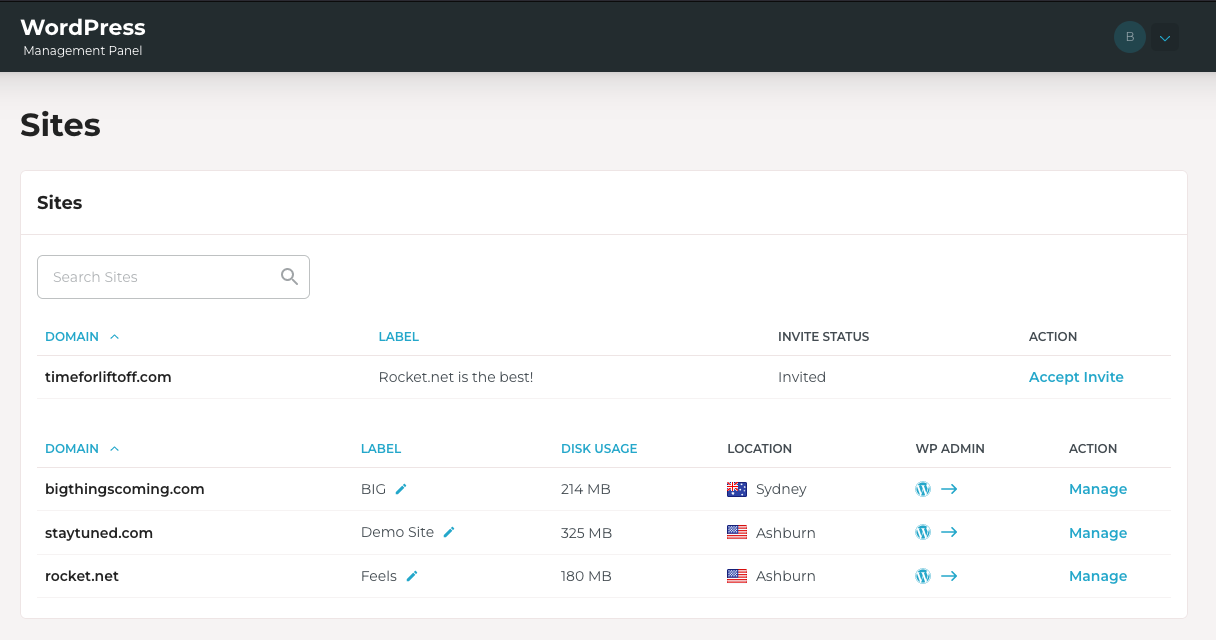
Pagely provides users with comprehensive tools for site migration, although the setup process typically requires one day. Their migration support is accessible through ticket and chat channels, offering an effective but slightly slower setup experience. In contrast, Rocket.net offers unlimited free migrations from any hosting provider. Their migration process is seamless and fully managed by their team, ensuring that there’s no downtime or service interruptions. This makes Rocket.net’s offering preferable for users looking for hassle-free site migration.
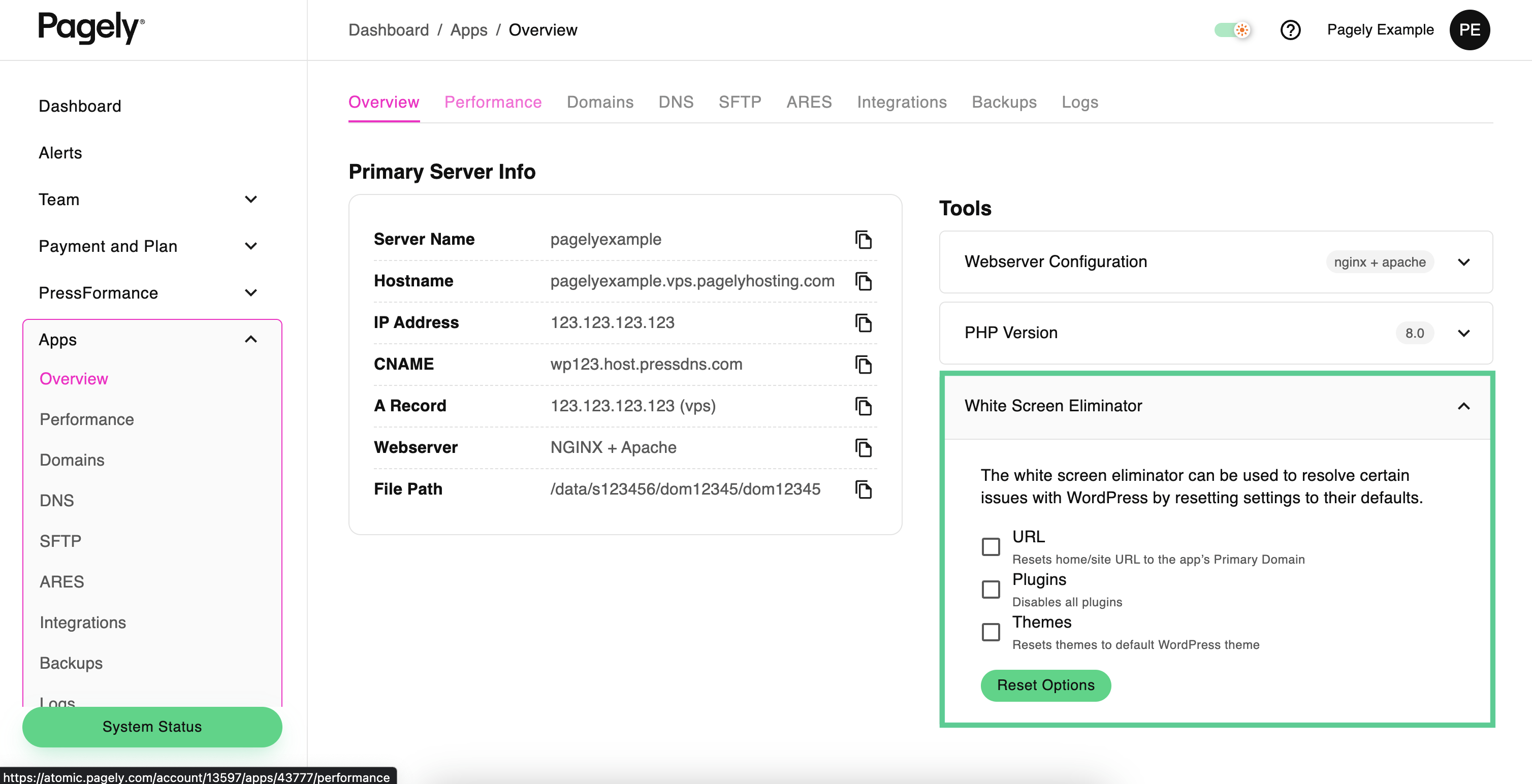
Pagely’s help center is extensive, covering topics from WordPress basics to advanced security measures. Their knowledge base includes easy-to-follow guides and is accessible at any time, making it useful for troubleshooting and learning. Rocket.net also boasts a highly accessible help center with 24/7 live chat, email, and phone support. They guarantee a 60-second response time, making it highly reliable for immediate assistance. Both platforms provide detailed resources, but Rocket.net’s instant support response time offers a notable edge.
User management
accessibility.
Score Components:
- Role customization (40%): Flexibility in creating and defining user roles and
permissions. - Ease of management (30%): User interface and tools for managing users.
- Access control (20%): Effectiveness of access control measures for different user
levels. - Scalability (10%): Ability to manage a growing number of users efficiently.
 8.4
8.4
 8.5
8.5
🏆 Winner
Rocket.net: Exceptional selective control panel access and effective user management for agencies.
Pagely offers an extensive system for managing user roles and permissions with seven distinct user roles, ensuring a clear distinction between different levels of access and control. The flexibility in creating and defining roles ranges from Account Owner with full permissions to App-Only-Minimal with more restricted access, making it suitable for various user scenarios. Rocket.net, on the other hand, emphasizes selective control panel access for WordPress sites, enabling customers to grant permissions specific to individual sites. Although it has fewer predefined roles, the ability to create sub-users with precise access adds a unique layer of granularity, particularly useful for agencies managing multiple sites.
Pagely’s user management interface is detail-oriented, catering to a wide array of administrative tasks. Users can manage 2-factor authentication, SSH/SFTP keys, and site-specific settings from a structured UI. Rocket.net’s interface stands out with its streamlined, white-label control panel that allows unlimited user additions, password resets, and site-level access management. The option to customize this interface further enhances its usability, providing a more tailored experience while maintaining simplicity in user operations.
Both platforms are adept at controlling access effectively. Pagely supports a comprehensive set of permissions across different roles, which ensures secure and versatile management for various administrative levels. Rocket.net’s platform efficiently manages user access via simple, site-specific controls. With its future enhancements, such as logo customization, Rocket.net is poised to support a growing number of users while maintaining efficient and secure access management, making it particularly scalable for organizations like digital agencies.
Pagely user roles table:
| Role | Description | Access highlights |
|---|---|---|
| Account Owner | Top administrative role | Full privileges, manage users, sites, SSH/SFTP, 2FA, billing, VPS servers |
| Super-Admin | High-level admin | Manage users, sites, SSH/SFTP, 2FA, VPS servers |
| Sub-Admin | Mid-level admin | Manage site-level users, sites, SSH/SFTP, 2FA, VPS servers |
| Tech | Technical role | Manage sites, SSH/SFTP, 2FA, backups, aliases |
| Billing | Financial management | 2FA, SSH/SFTP, backups, aliases |
| App-Only | Application-specific role | 2FA, SSH/SFTP, backups, aliases |
| App-Only-Minimal | Restricted application role | 2FA, SSH/SFTP, backups, aliases |
Rocket.net user roles table:
| Role | Description | Access highlights |
|---|---|---|
| Site User | Specific site management | Grant access to individual sites, manage sites with 2FA, customize control panel |
Customer support
hosting provider.
Score Components:
- Support communication channels (30%): Measures the variety of customer support types
provided (live chat, chatbot, email, phone, etc.) - Availability (20%): Assesses the availability hours for each channel, including 24/7
support options. - Technical support quality (30%): Assesses whether the provider offers comprehensive
technical support, including hardware upgrades (e.g., HDD to SSD), software installations, and web
server configuration changes. - Enterprise support (20%): Checks if there are dedicated or priority support services
for enterprise-level customers.
 8.9
8.9
 9.2
9.2
🏆 Winner
Rocket.net: Distinguished for its instant responses and diverse support channels available around the clock.
 |
 |
|
|---|---|---|
Phone support |
||
Live chat support |
||
Chatbot |
||
Email/ticket support |
||
Enterprise support (dedicated agent, priority support) |
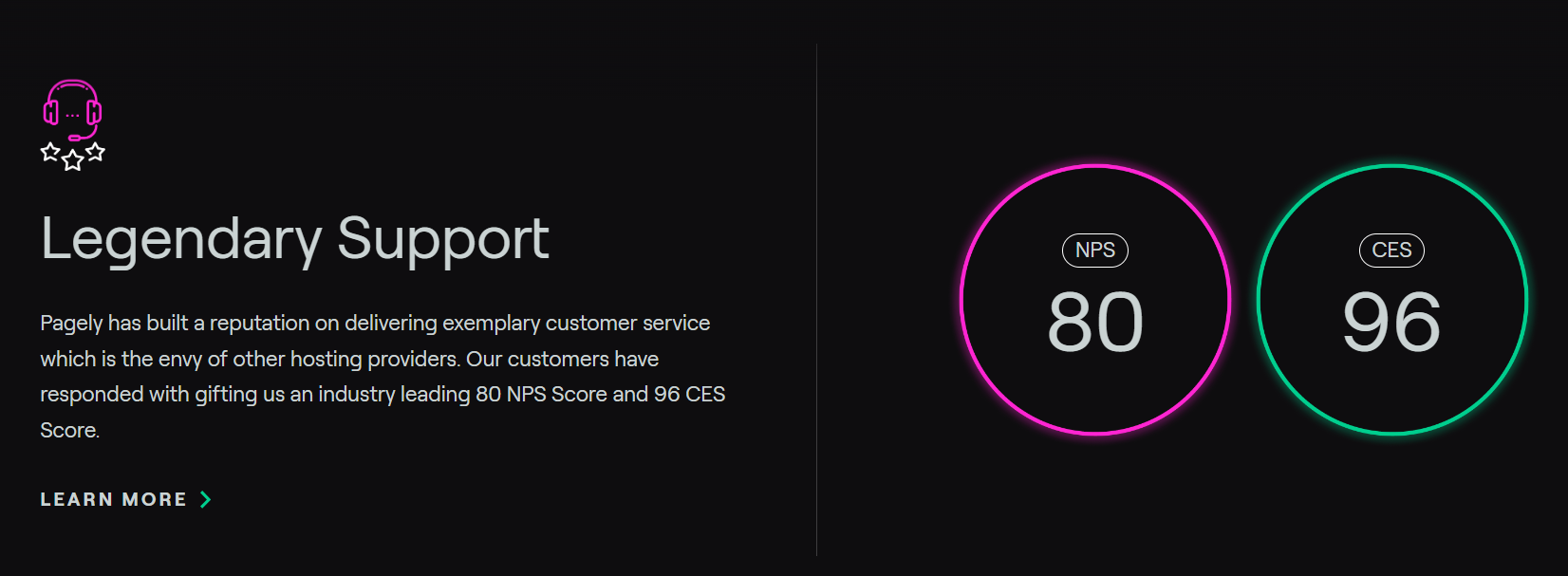
Pagely and Rocket.net both offer extensive customer support options, but Rocket.net sets itself apart by providing 24/7/365 availability across multiple channels. Rocket.net’s live chat responds within 45 seconds, while Pagely’s chat service, available through its Atomic interface, operates round the clock. Both providers support email and ticket systems, but Rocket.net’s typical email response time of six minutes stands out for its swiftness.

In terms of specialty support, Pagely’s tierless system is noteworthy, with engineers able to resolve issues directly without escalation. Rocket.net matches this with dedicated enterprise support, including a private Slack channel and a dedicated phone line. Pagely’s support availability is equally diverse, although their Slack channel support is limited to business hours. Rocket.net gains an edge with additional perks like free migrations and a strong focus on WordPress and WooCommerce support.
Pagely vs Rocket.net: User feedback
Users highly appreciate this hosting provider for its exceptional reliability and top-notch customer support, often comparing it to having an on-call DevOps team. The platform is praised for its speed, security, and a suite of features designed specifically for WordPress hosting. Many find the management tools intuitive and effective, though some express a desire for improvements in specific areas like the Atomic dashboard and multi-user access. The main criticism revolves around the high cost, which is noted as a barrier for smaller operations, but many users agree the premium price is justified by the service’s quality and reliability.
Users highly praise Rocket.net for its superior support, user-friendly interface, and top-notch security features. The integration with Cloudflare Enterprise and the inclusion of an Enterprise CDN are standout benefits, saving users money and reducing the need for additional plugins. Customers appreciate the platform’s powerful features, including staging areas, manual backups, and integrated file management. While feedback is overwhelmingly positive, a minor suggestion includes the addition of more analytic tools.
Pagely vs Rocket.net: FAQ
Which platform is better suited for hosting WordPress websites?
Both Pagely and Rocket.net are well-suited for hosting WordPress websites, as each offers specialized WordPress hosting with advanced features and support. Pagely is ideal for enterprises needing high-availability and customizable solutions, whereas Rocket.net excels in user-friendly setups, speed, and cost-effective options. The choice depends on specific needs such as performance, security, and budget.
Which hosting service offers better security features?
Pagely offers robust security features utilizing AWS Shield Standard for DDoS protection and a proprietary web application firewall. Rocket.net employs an enterprise-level WAF and real-time malware protection powered by Imunify360. Both provide strong security measures, but Pagely’s advanced security features and compliance certifications give it a slight edge for those needing high-level security.
Which platform offers better customer support?
Both Pagely and Rocket.net offer extensive customer support options, including phone, live chat, and email/ticket support. Rocket.net sets itself apart with 24/7/365 availability across multiple channels and a quick response time of 45 seconds for live chat. Pagely also provides robust support, but Rocket.net’s instant availability gives it a notable edge.
Which hosting service offers more scalability options for growing websites?
Pagely offers highly customizable and scalable plans, including advanced configurations like multi-region redundancy and dedicated database resources, making it ideal for enterprises needing extensive scalability. Rocket.net does not provide specific details about scaling, but its competitive pricing at various tiers supports growing businesses. Pagely’s advanced and tailored solutions provide better scalability options overall.
What are the major differences in pricing and value between pagely and rocketnet?
Pagely offers high-performance plans starting at $199/month with advanced features and customizable configurations, while Rocket.net provides competitively priced plans starting at $30/month with unlimited PHP workers and extensive security features. Rocket.net’s affordability and feature set make it a better value for cost-sensitive users, while Pagely’s premium pricing is justified by its advanced capabilities and high-level performance.
The making of this blog
We followed a clear, step-by-step process to write and research this article.









